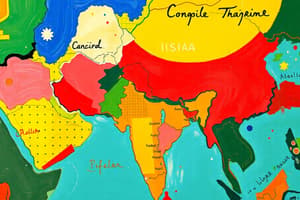Podcast
Questions and Answers
What was the period of the Morley-Minto Reforms?
What was the period of the Morley-Minto Reforms?
- 1919
- 1935
- 1909 (correct)
- 1858
What did the Montague-Chelmsford Reforms of 1919 introduce?
What did the Montague-Chelmsford Reforms of 1919 introduce?
- Centralized Administration
- Provincial Autonomy
- Dyarchy at the Provinces (correct)
- All India Federation
What was the main purpose of the Government of India Act 1935?
What was the main purpose of the Government of India Act 1935?
- Establishing Provincial Autonomy (correct)
- Implementing Rule of Law
- Creating Centralized Administration
- Introducing All India Federation
Which feature was a part of the British Administration influencing Indian Administration?
Which feature was a part of the British Administration influencing Indian Administration?
What was the administrative setup of the East India Company focused on?
What was the administrative setup of the East India Company focused on?
What were the objectives of Unit 3 in the evolution of Indian Administration?
What were the objectives of Unit 3 in the evolution of Indian Administration?
Who were the initial arrivals of the British in India and under what banner did they come?
Who were the initial arrivals of the British in India and under what banner did they come?
What were the main reforms introduced by the British Administration between 1858 and 1935?
What were the main reforms introduced by the British Administration between 1858 and 1935?
What were the main features of British Administration influencing Indian Administration?
What were the main features of British Administration influencing Indian Administration?
What was the machinery of Dyarchy at the Provinces?
What was the machinery of Dyarchy at the Provinces?
Study Notes
Objectives of the Unit
- Explain the administrative structure of the East India Company.
- Highlight the reforms enacted by British Administration from 1858 to 1935.
- Elaborate on the main features of British Administration in India.
Overview of the East India Company
- The East India Company began as a trading entity.
- Transitioned to a governing body following the decline of Mughal power and the Rebellion of 1857.
British Administrative Reforms
- Morley-Minto Reforms (1909): Introduced limited self-governance in the provinces and expanded legislative councils.
- Montague-Chelmsford Reforms (1919): Expanded the franchise and proposed an increase in Indian participation in governance.
- Dyarchy (Provinces): Implemented a system dividing responsibilities between elected Indian ministers and British officials.
Government of India Act (1935)
- Established an All India Federation with a significant degree of provincial autonomy.
- Aimed to create a unified administrative structure across British India, enhancing self-governance.
Features of British Administration Influencing Indian Administration
- Centralized Administration: Concentrated power in a central government, limiting provincial autonomy.
- Provincial Government: Established provincial assemblies with varied powers, allowing limited local governance.
- Local Government Structure: Developed a comprehensive framework for local governance, including municipalities and panchayats.
- Rule of Law: Established a framework wherein laws applied uniformly, promoting legal equality.
- Civil Services: Created a bureaucratic framework, primarily composed of British officials, with a focus on merit-based recruitment.
Conclusion
- The British administrative system laid the groundwork for future governance in India, influencing its structure and practices.
Studying That Suits You
Use AI to generate personalized quizzes and flashcards to suit your learning preferences.
Description
Test your knowledge on the evolution of Indian administration with a focus on the British administrative system. Explore topics such as the East India Company, Morley-Minto Reforms, Montague-Chelmsford Reforms, and the Government of India Act 1935. Delve into the features and structures that shaped the administrative landscape during this period.




